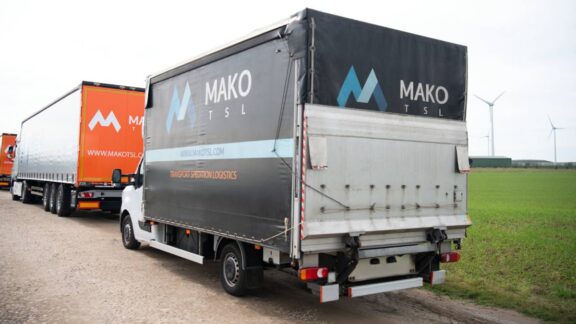The year 2025 marks another consecutive year of significant regulatory changes in road transport across Europe, impacting companies in the Transport-Spedition-Logistics (TSL) industry. As an active market participant and a leader in the light transport sector, MAKO TSL closely monitors all regulatory changes and analyzes their implications for our business benefit as well as our Partners. Below, we outline key changes and their potential consequences for the industry.
New Tachograph Regulations
As we mentioned last year in our perspectives for TSL market, in 2025, new tachograph regulations will be enacted, requiring transport companies to update their driver work time monitoring systems. This is one of our industry’s most widely discussed regulatory changes, with ongoing an heated debates. The aim is to enhance road safety and ensure compliance with working time and rest period standards for drivers. The new tachographs will allow remote vehicle monitoring by the authorities without requiring vehicle stoppage if no violations are detected.
So-called second-generation tachographs are mandatory for vehicles over 3.5 tons GVW (while smaller trucks still face upcoming tachograph implementation in 2026). However, in December, during a special meeting of the EU Road Transport Committee, member states introduced a two-month transition period, during which carriers will not be penalized for lacking the required tachographs. This period will last until the end of February 2025.
New Requirements for Non-EU Carriers
From January 2025, non-EU carriers wishing to operate within the internal EU market will be required to register SENT (EKMT) permits. The purpose of this regulation is to reduce unfair competition and increase market transparency. Carriers must meet specific formal requirements, such as providing documentation confirming compliance with EU regulations and paying the relevant fees.
These changes may affect the competitiveness of transport companies, especially those from regions with lower operational costs. They also address a frequently raised issue by intra-EU carriers regarding discrepancies in formal business requirements, which have made them less competitive compared to less regulated third-country entities.
Increases in Road Tolls and Taxes
The European Union has mandated member states to incorporate CO₂ emissions costs into road tolls by March 1, 2024. Additionally, new transport tax rates will be introduced in 2025, with higher rates applied to high-emission vehicles. Carriers that do not invest in fleet modernization will face increased financial burdens, affecting the operational cost structure of companies and posing a challenge to profitability.
This is a result of the EU’s ongoing policy to reduce carbon dioxide emissions in the internal market. On the one hand, from a long-term perspective, these measures have positive effects, including combating climate change and improving economic efficiency by reducing fleet operating costs. However, regulators must consider the high costs of these changes and implement them gradually and sustainably to avoid jeopardizing the TSL sector and companies that may struggle to bear these costs in such a short time frame.
Mandatory ESG Reporting
Companies in the TSL sector will be required to report on Environmental, Social, and Governance (ESG) factors. These requirements include implementing sustainability strategies in line with the EU’s Corporate Sustainability Reporting Directive (CSRD). From 2024, ESG reporting requirements apply to the largest companies, and in 2025, they will extend to large firms with over 250 employees, a balance sheet total exceeding €25 million, or annual revenues exceeding €50 million. These enterprises must comply with the new requirements and submit their first reports in 2026.
This is another element of the European Union’s climate change strategy, placing additional obligations on TSL companies. At MAKO TSL, we plan to comprehensively summarize our Environmental Mission, which was set for 2025, and develop a new strategy that aligns with all guidelines and directives that challenge road transport operators in the EU. We have also spoke about the ways we reduced costs and implemented environmental changes in the past.
Implementation of the “Trust & Check” Program
In 2025, the “Trust & Check” program will be introduced, replacing the Authorized Economic Operator (AEO) status. This program aims to simplify customs processes and accelerate clearance procedures. Companies holding this status will be able to introduce goods to the EU market without active customs intervention. The program will also include functionalities such as automatic generation of customs documents and reports, as well as periodic customs duty settlements.
Legal process simplifications are always welcomed by entrepreneurs, and the transport sector is no exception. The key factor will be the details of the program and how its provisions are implemented. Nevertheless, it is encouraging to see regulatory changes that not only impose new requirements on transport companies but also aim to support their operations.
Abolition of Customs Exemptions for Low-Value Goods
In 2025, the customs exemption for goods valued below €150 will be abolished, aiming to eliminate the underreporting of goods’ value. This change is crucial for the e-commerce sector, which will need to adjust its declaration systems to meet the new requirements. These changes will be supported by the EU’s customs data center, which utilizes artificial intelligence for data analysis, risk mitigation, and threat prediction.
In contrast to the previous point, we now see the elimination of customs exemptions that were previously in place. Time will tell whether the simplifications introduced by the “Trust & Check” program will counterbalance these changes. The fact that these exemptions apply to low-value goods may limit the impact of this regulatory decision on the TSL sector. However, the rapid growth of e-commerce means that companies in this industry are increasingly outsourcing transportation services at a time when the traditional market is experiencing stagnation.
What Will 2025 Bring for the TSL Industry?
The year 2025 will bring numerous legal changes in road transport across Europe, affecting companies in the TSL sector. Businesses must adapt to new requirements such as SENT permit registration, road toll and tax increases, mandatory ESG reporting, the implementation of the “Trust & Check” program, the abolition of customs exemptions for low-value goods, and new tachograph regulations.
To remain competitive, companies must continuously monitor these changes and incorporate them into their development strategies by investing in fleet modernization, adapting operational systems, and training employees. MAKO TSL closely follows these developments—we believe that our position as an industry leader obliges us not only to comply with all regulations (regardless of market opinions on them) but also to assist our Partners in preparing as effectively as possible for the future.



